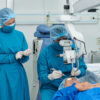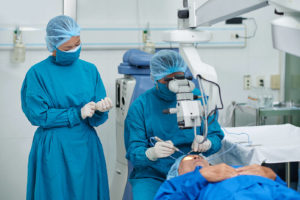
Is Cataract Surgery the Right Choice?
Do you have cataracts? Are you sick and tired of diminishing vision because of your cataracts? If you said yes to either of these questions, then you must be one of the many people who are contemplating cataract surgery.
But like any surgery, you might find yourself asking whether it’s the right choice for you. Surgery is invasive and risky. Although cataract surgery is nothing like it used to be and the recovery time is minimal, there’s still a lot to think about before saying yes to the surgery.
Before you decide, there are a few things you need to know about cataract surgery. Today, we’ll go over a few things like how it’s done, what the recovery is like, what the risks are, pricing, and of course, natural non-invasive alternatives. So before calling your surgeon to make an appointment, ensure you’ve thought everything through.
What Are Cataracts?
Cataracts are a common vision problem in people over the age of 40. Scientists project that by 2030, nearly 40 million Americans will have cataracts. These days, by the age of 70, about half of us will have cataracts if we don’t take the proper preventative measures.
Cataracts are a very common age-related disease, although some babies can be born with cataracts. This form of cataracts is very rare.
Cataracts cause clouded and blurred vision when the lens of the eye begins to cloud over. Cataracts form when there is a build-up of protein on the lens. If you looked at an eye with cataracts you would see a grayish cloud covering the pupil (the black part) of the eye.
Cataracts are easily spotted. Besides being actually able to see one on the lens of the eye, cataracts can also bring on blurred or clouded vision, nearsightedness (mostly in older people), difficulty driving at night due to glare from headlights, double vision or a sudden change in your eye wear prescription.
Be on the lookout for any of these symptoms. Cataracts can begin to form on the lens in people as young as 35 years old. If you think you may have cataracts, schedule an appointment with your eye doctor immediately to get a true diagnosis.
Cataract Treatment
Depending on what type of cataracts you have and how early the disease was caught, there are several treatments available.
Generally, treatments involve improving the conditions of the symptoms associated with cataracts. This includes eyeglasses with a new prescription, anti-glare sunglasses, brighter lighting in your home, and magnifying glasses.
Trials done on mice with cataracts show that eye drops may be able to reverse and dissolve cataracts, but this is a hope for the future. Human trials are needed to observe how the eye drops affect vision and visual acuity. It’s tough to ask a mouse how their visual acuity is!
And, of course, surgery is an option. Cataract surgery is quite popular, especially when the condition gets in the way of everyday life. Let’s find out if surgery is the right choice for you.
Cataract Surgery: The Procedure

A word of warning to those who might be squeamish: we’ll be describing how cataract surgery is performed, which could be upsetting to some people.
Cataract surgery involves replacing the entire lens of the eye. During the surgery, the lens will be removed and replaced with an artificial lens called an intraocular lens. This lens will help to restore lost vision.
The lens is taken out of the eye using a technique of high frequency ultrasound to break the lens away from the rest of the eye. Once it has been successfully detached from the rest of the eye, the lens is suctioned out of a small incision hole using a suction cup.
When the original lens is removed, the artificial lens is put in right behind the iris and the pupil, where the old lens used to be. In some rare cases, the new lens may be placed in front of the pupil and iris, but this is uncommon.
Once the lens is secure, the incision is closed up. Sometimes, the doctor will put in a stitch. A protective seal is put over the eye to protect it during the recovery process.
LASIK Cataract Surgery
LASIK cataract surgery is another surgical option that was recently approved by the FDA. However, this method of cataract surgery is much less common because purchasing LASIK equipment is too expensive for most doctors, especially when the high frequency ultrasounds work just fine.
Regardless of the type of surgery, after the procedure is done you will need someone to take you home. You’ll be given medicated drops to use for up to a month after the surgery. You’ll need to wear a protective seal on your eye during naps and when you sleep.
During the first week post-surgery, you won’t be able to do any strenuous activity such as exercising, heavy lifting and swimming. You definitely need to keep water out of your eye to avoid reopening the incision.
Risks
No surgery is without risk. No matter how safe and easy modern cataract surgery claims to be, there are certain risks to be aware of before going under the knife (or metaphorical knife, if you’re going for the LASIK option).
Here are the most common cataract surgery risks:
- Bleeding
- Infection and inflammation
- Retinal detachment
- Glaucoma
- Loss of vision
- Drooping eyelids
- Secondary cataracts
The last one on the list is a bad one. Cataract surgery can cost thousands of dollars. For that price, is it worth risking cataracts developing on your artificial lens? Ultimately, it’s up to you, but it is definitely something to think about. LASIK surgery also comes with its own set of risks.
Is Cataract Surgery Right for You?
So, is surgery the right option for you? Truth be told, if your cataracts don’t diminish your quality of life and don’t interfere with your day to day activities and the things you love, then no. Cataract surgery is not worth the risk.
If a cataract is caught early and treated properly to halt the disease, then there should be no need for cataract surgery. Your best bet is talking to your doctor about it. They’ll be able to give you professional advice about your specific case.
Diet as an Alternative to Surgery
Before turning to surgery for your cataract problems, try treating it naturally. People with cataracts have been treating the disease by simply changing up their diet for decades!
Studies show that consuming antioxidants like the ones found in vitamins C and E, lutein and zeaxanthin can slow the progression of cataracts and help prevent them.
Before thinking that cataract surgery will magically make your cataracts go away, learn the truth about it and get more information from your doctor.
Our Rebuild Your Vision Ocu-Plus Formula Contains All 17 Vitamins, Minerals, and Herbal Supplements to Protect Against Cataracts!













I have used Aloe vera juice in an eye bath for my own cataract problem – it is not an instant cure but my cataract has diminished and I dont have to be concerned about it now..If is is too painful to use straight Aloe juice then dilute it with water – Aloe vera will not harm your eyes but persevering application will pay off ; Aloe vera can sting but it will then heal .
thank you for this comment. what quality of Aloe vera you have used. I have 100% destilat of Aloe vera, clear like a water without conservans. from company Holistic, produced in Warren Laboratories Texas US. Doctor said that my cataract is 80% but I don’t have much trouble ..I can read and work without glasses, only faces outside on distance 50 m are blurred. How was it with your cataract situation? Thank you for reply.
I want to cure cataract without a surgery. How can I do it.?
DMS0 is a solvent and you should reduce it down with distilled water to 70%. I put one drop in each eye twice a day. In ayears time I cured my Glaucoma and the cataracts were reduced. Another product is “Isolone” from India. Look it up. It is safe and effective if you get the cataracts early.